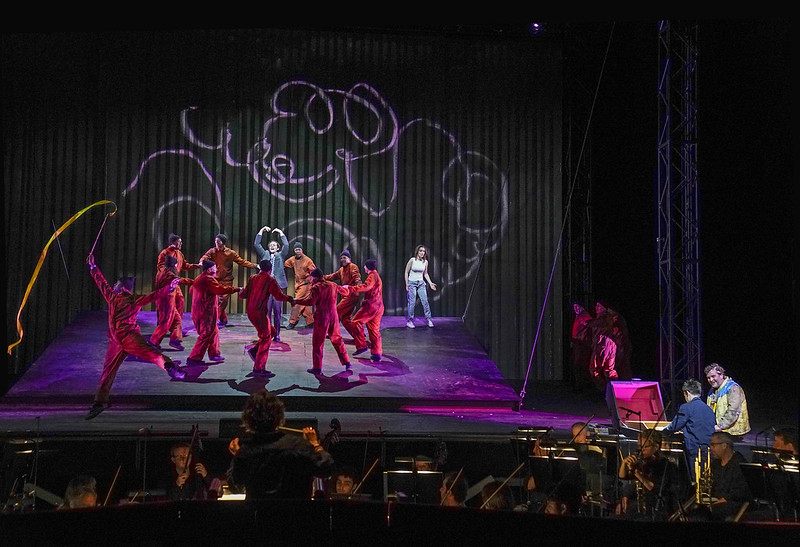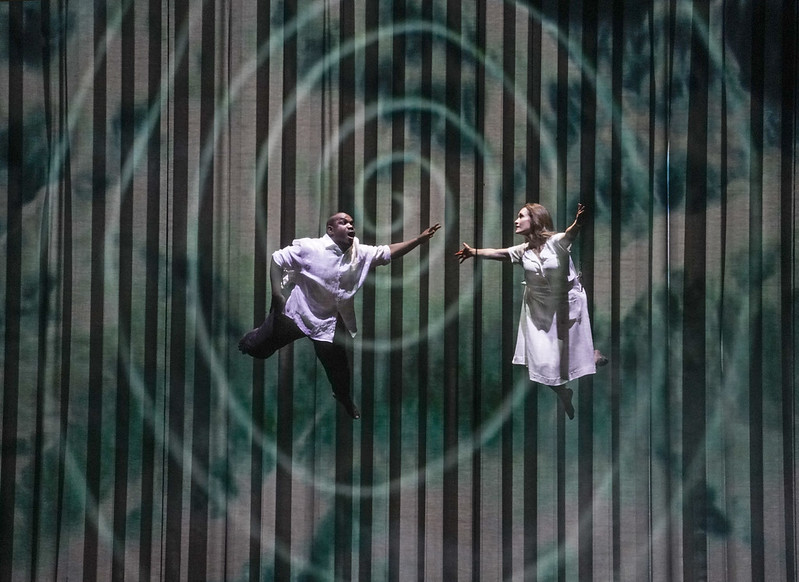The season of retransmissions from the Metropolitan Opera to the cinema ended brilliantly this Saturday, June 3 with The Magic Flute signed Simon McBurney. This production, new for the Met where it should have been represented during the 2020/2021 season canceled due to covid, was created in the Netherlands in 2012 before being offered at the Festival d’Aix-en-Provence in 2014 and finally at the English National Opera in 2019. The British director situates the action in our time in a world at war, as evidenced by the fatigues worn by the three ladies at the raising of the curtain or the guerrilla outfit of Tamino in act two. Most of the costumes come in dark hues except for those of Papageno and Papagena dressed in colorful outfits, yellow, blue, pink and Pamina’s white dress. In the center the action takes place on a huge mobile square board which rises or tilts according to the different scenes. On both sides the public attends the setting up of sound effects and projections. On the garden side, a cabin where special visual effects are performed, such as the appearance of the snake in the first act, the fire and water of the events in the second, and on the courtyard side, a bar with bottles that will serve as glass harmonicas for Papageno’s aria “Ein Mädchen oder Weibchen”, as well as other accessories devoted to various sound effects, wind, rain, birdsong, etc. On the stage, the birds are represented by extras who wave sheets of paper. The pit is raised to allow the musicians to be on the same level as the characters and for some to be integrated into the action like the flautist or the percussionist who plays the glockenspiel. The direction of actors is extremely precise and rigorous. The framework of the story imagined by Schikaneder and Mozart is respected except for a few details. Here the three children, made up as little old people, look like the Gollum of the Lord of anneaux and the Queen of the Night is an old woman in a wheelchair, no doubt a symbol of a world ending At the end of the book, instead of being sent back into darkness, she obtains Sarastro’s forgiveness and enters the light to witness the triumph of his daughter alongside Tamino, a denouement altogether questionable.
Magic Flute © Karen Almond / Met Opera
The homogeneous and flawless distribution is dominated by the astonishing delivery of Kathryn Lewek as Queen of the Night who interpreted this role for the fiftieth time on the stage of the Met. A record. The somewhat rocky voice is wide and seems well projected, it becomes pleading in its opening air to better manipulate Tamino and aggressive in a spectacular “Der Hölle Rache” sung with confusing intensity. If her counter-fas are not always impeccable, their formidable efficiency won over the public, who gave the singer a long ovation at the end of the aria. Erin Morley portrays an exquisite Pamina whose fragility is highlighted by her clear timbre and the delicacy of her singing line in her particularly moving “Ach ich fühl’s” which she concludes with a B flat pianissimo. By his side, Lawrence Brownlee offers a vocally impeccable Tamino. The timbre is not lacking in seduction and his nuanced interpretation of “Dies Bildnis ist bezaubernd schön” immediately convinces the audience. His long association with the Belcantist repertoire proves to be an asset in this particularly complex role and his German is completely intelligible. Scenically, on the other hand, the actor is a little clumsy and it is difficult to imagine him, especially in the cinema, as a prince charming capable of seducing Pamina at first sight or of arousing the concupiscence of the Ladies of the Night. For his Met debut Thomas Oliemans, well accustomed to the role of Papageno, which he has made a specialty of, embodies a touching and funny bird catcher. The Danish baritone has solid means associated with a beautiful theatrical presence. his compatriot Stephen Milling has a deep and resonant voice that allows him to assume with ease the low Fs that dot his part. His Sarastro has all the benevolent authority the character requires. Finally Brenton Ryan is a brightly-voiced, well-projected Monostatos whose aria “Alles fühlt der Liebe Freuden” was warmly received. Finally, let’s salute the appearances of the three ladies, alternately sassy or disturbing, vocally impeccable, just like the three children with their white and fair voices.

Magic Flute © Karen Almond / Met Opera
At the head of an Orchestra and the Metropolitan Choir in great shape, Nathalie Stutzmann will have offered the New York public a winning diptych even if its direction of The fluteremarkable as it is, does not quite reach the same heights as that of its exceptional Don Giovanni of May 22. The score is given in its entirety with the exception of the duettino “Bewahret euch vor Weibetücken” between the two priests, the text of which was undoubtedly deemed politically incorrect.
The next season of Metropolitan Opera broadcasts in Pathé Live network cinemas will open on October 21, 2023 with Dead Man Walkinga contemporary opera by Jake Heggie with Joyce DiDonato.
2023-06-03 07:00:00
#MOZART #Magic #Flute #York #streaming #Forum #Opéra


